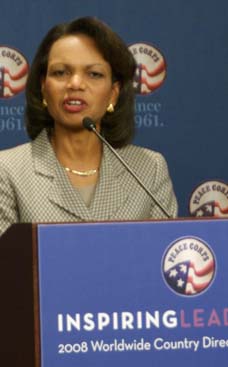
The reason given: the nominee and the Bush administration refuse to include North Korean human rights in the six-party process agenda and otherwise make it a more visible feature of the US policy towards North Korea. The situation is unfortunate and could ultimately prove self-defeating. It threatens to undermine the very way in which the six-party talks address human rights. Currently, the working groups on US-North Korea and Japan-North Korea normalization are homing in on human rights as a pre-condition. Efforts to use the talks as the basis for creation of a regional security mechanism provide the right opportunity to push North Korea into greater accountability on international human rights standards. It would be a shame for the human rights issue to derail the negotiations. It does not take much imagination to foresee the North Koreans retreating back into isolation and resuming its clandestine efforts to develop nuclear weapons, once again assuring itself that it is the only way to deal with the outside world.
Despite strong endorsements from both sides of the aisle and a unanimous recommendation from the Senate Foreign Relations Committee,the nomination of veteran diplomat Kathleen Stephens to the post of ambassador to South Korea has been stalled by a single member of the US Senate
US caught in wrangle over envoy
By Hahm Chaibong
United States efforts to deal with North Korea have always presented an exquisite foreign-policy dilemma: whether to negotiate with a "rogue state" that brutally and systematically violates the human rights of its own people. During its first six years, the George W Bush administration took a hard line that focused on "regime change" coupled with a refusal to "engage".
The unfortunate result is that North Korea is now in possession of many more nuclear bombs (minus one that has been detonated) than when President Bush assumed office. Northeast Asia is no closer to achieving regional peace and stability. The North Korean people continue to suffer.
In 2006, the Bush administration began to adopt a more pragmatic policy by starting direct bilateral negotiations with North Korea while actively participating in the framework of six-party talks on the North's nuclear program. The results have been dramatic. Last week North Korea submitted a declaration on its nuclear program. Bush promptly reciprocated by scratching North Korea from the US list of state sponsors of terrorism. The next day the cooling tower of North Korea's nuclear power plant at Yongbyon was blown up in front of foreign observers and media.
Not everyone agrees with this US policy turnabout. Some say it has yielded too much by promising to drop North Korea from the terrorism list in exchange for a less-than-complete disclosure of the country's nuclear programs, while others complain North Korean human rights abuses have been relegated to the back burner.
This brings us to the current US domestic political impasse: a hold on the nomination of veteran diplomat Kathleen Stephens to the post of ambassador to South Korea. Despite strong endorsements from both sides of the aisle and a unanimous recommendation from the Senate Foreign Relations Committee, the nomination has been stalled by a single member of the US Senate. The reason given: the nominee and the Bush administration refuse to include North Korean human rights in the six-party process agenda and otherwise make it a more visible feature of the US policy towards North Korea.
The situation is unfortunate and could ultimately prove self-defeating. It threatens to undermine the very way in which the six-party talks address human rights. Currently, the working groups on US-North Korea and Japan-North Korea normalization are homing in on human rights as a pre-condition. Efforts to use the talks as the basis for creation of a regional security mechanism provide the right opportunity to push North Korea into greater accountability on international human rights standards.
It would be a shame for the human rights issue to derail the negotiations. It does not take much imagination to foresee the North Koreans retreating back into isolation and resuming its clandestine efforts to develop nuclear weapons, once again assuring itself that it is the only way to deal with the outside world.
The nomination of Stephens, with her distinguished human rights track record in South Korea, the Balkans and Northern Ireland, is broadly popular among South Koreans who appreciate her Korean ties. A former Peace Corps volunteer in the country and fluent Korean speaker, she is considered the first genuine "Korea hand" to be named to this important post. South Korea is in the throes of a major debate on how to redefine relations with the United States. The appointment of someone with whom Koreans identify can certainly have a positive effect in strengthening the alliance - and, ultimately, producing progress in North Korea.
Here we must remind ourselves of the ultimate goal in dealing with North Korea: the improvement of the lot of the North Korean people and the "normalization" of the regime. The best way is to proceed to negotiate with the regime, however distasteful that may be. If and when a breakthrough comes and North Korea normalizes relations with the United States, it will open up the floodgates to foreign aid and investment that will surely transform the country quickly and dramatically.
This is not to say that human rights in North Korea should be relegated to the back burner. Indeed, the championing of North Korean human rights by Congress and NGOs should continue while the Bush administration continues to try to "open" North Korea through negotiations. This would only be in the best tradition of US foreign policy - striking that delicate balance between promoting and defending universal values such as human rights, on the one hand, and pragmatism, on the other.
Hahm Chaibong (chahm@rand.org) is a senior political scientist at RAND Corporation, a non-profit institution that helps improve policy and decision-making through research and analysis.









